 Petzlover
Petzlover Both Oriental Bicolour and Pantherette are originated from United States. Both Oriental Bicolour and Pantherette are having almost same weight. Both Oriental Bicolour and Pantherette has same life span. Both Oriental Bicolour and Pantherette has same litter size. Both Oriental Bicolour and Pantherette requires Low Maintenance.
Both Oriental Bicolour and Pantherette are originated from United States. Both Oriental Bicolour and Pantherette are having almost same weight. Both Oriental Bicolour and Pantherette has same life span. Both Oriental Bicolour and Pantherette has same litter size. Both Oriental Bicolour and Pantherette requires Low Maintenance.
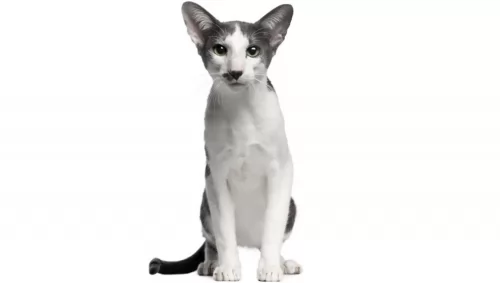 Oriental Bicolour cats owe their origins to Lindajean Grillo of Ciara Cattery. The cats hail from the United States. It was in 1979 that Grillo paired a Siamese and bicolored American Shorthair, selecting the best bicolored offspring to mate again with Siamese or Orientals.
Oriental Bicolour cats owe their origins to Lindajean Grillo of Ciara Cattery. The cats hail from the United States. It was in 1979 that Grillo paired a Siamese and bicolored American Shorthair, selecting the best bicolored offspring to mate again with Siamese or Orientals.
This particular variety was granted recognition in 1983 by TICA. It was during the 1980s that European breeders started their own Oriental bicolor breeding lines. The first modern Oriental Bicolours were imported to the UK during 2004.
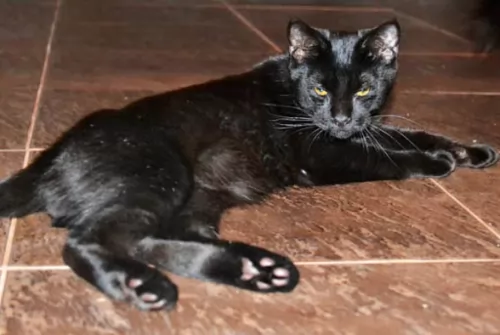 There isn’t too much history to the beautiful black Panetherette cat as it is still in development. It is in other words a hybrid cat and the name ‘Pantherette’ was give to the cat to describe its magnificent looks.
There isn’t too much history to the beautiful black Panetherette cat as it is still in development. It is in other words a hybrid cat and the name ‘Pantherette’ was give to the cat to describe its magnificent looks.
It looks just like the wild Black Panther or Black Leopard. There is, however, certainly no wild black panther or leopard that has been used
The Pantherette is a hybrid breed of cat that is still under development. It is intended to look similar to a Black Panther. It is a new breed based on a Melanistic (Black) Bengals as one of the foundation breeds.
The Pantherette is registered with the International Progressive Cat Breeders Alliance (IPCBA).
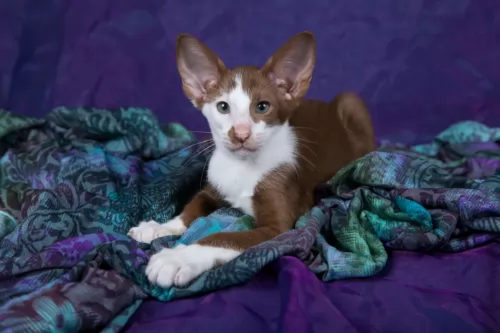 These cats with a triangular-shaped head and slender, long body have a fairly thin tail. The ears are widely set and are large. The eyes are green, but blue with the colorpoint varieties.
These cats with a triangular-shaped head and slender, long body have a fairly thin tail. The ears are widely set and are large. The eyes are green, but blue with the colorpoint varieties.
The coat is short, close-lying and sleek while the coat of the long-haired variety is fine and silky with no thick undercoat. The tail forms a plume. The coat is mostly white and the other part of the coat can be in any other color. You’ll always see quite a bit of white around the legs.
These cats are suited for singles, couples, families, and seniors - in fact, anyone still active enough to provide this cat with lots of attention.
These vibrant cats are known for their social, friendly and loving personality. They are intelligent, inquisitive, active cats that need to have plenty of interaction with their human family members. They love their human family and love to hold conversations with them.
They're entertaining too, and love nothing more to ve the center of attention. They're so into their human family that you may even have him waiting patiently for you to come home fro work. He shouldn't be left alone for hours on end and should rather have a pet friend to keep him company during the day.
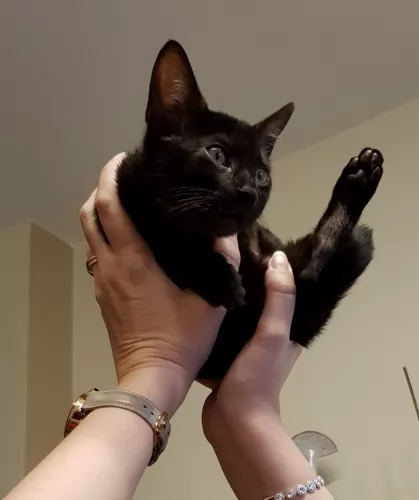 The Panehterette is a medium to large black cat still being developed, It weights in the area of 4 – 9kg. It is muscular and strong with a long body and a broadish head.
The Panehterette is a medium to large black cat still being developed, It weights in the area of 4 – 9kg. It is muscular and strong with a long body and a broadish head.
The legs at the back are slightly longer than the front. The legs are strong and muscular and medium in length with large, round paws. The tail of the Panethereet is medium to long in length, thick and slightly tapered.
The beautiful coat is short to medium in length and luxurious and silky. The ears are small to medium with rounded tips. The eyes are oval and set wide apart. They can be gold-colored or green.
The Pantherette breed is still in the beginning stages of its development, so there isn’t too much information on its temperament. Those who work with these cats say that they have the typical temperament of a domesticated cat and that they are alert, friendly, curious and that they enjoy being in the company of their human companions.
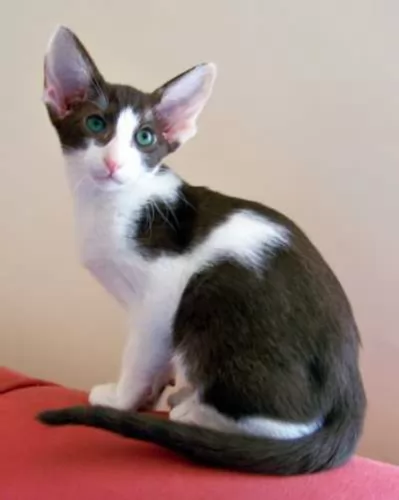 The Oriental Bicolor is such a wonderful pet to have. They are intelligent, entertaining, loving, active, playful, and inquisitive.
The Oriental Bicolor is such a wonderful pet to have. They are intelligent, entertaining, loving, active, playful, and inquisitive.
They’re also athletic and energetic. These cats have got all the characteristics you want in a good friend. They make a fantastic companion to people who are active and happy. They’re also very vocal and have a lot to say to their human family.
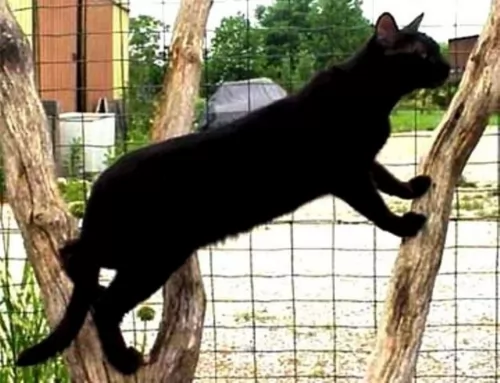 Domestic hybrid cats such as the Pantherette make great pets. However, you need to bear in mind that these cats have that wild side to them and they often try to escape.
Domestic hybrid cats such as the Pantherette make great pets. However, you need to bear in mind that these cats have that wild side to them and they often try to escape.
They are larger than the regular cat and its always advisable to have an outdoor shelter for them as well. The Pantherette is a truly beautiful cat but read up all you can on hybrid cats before you bring one into your home.
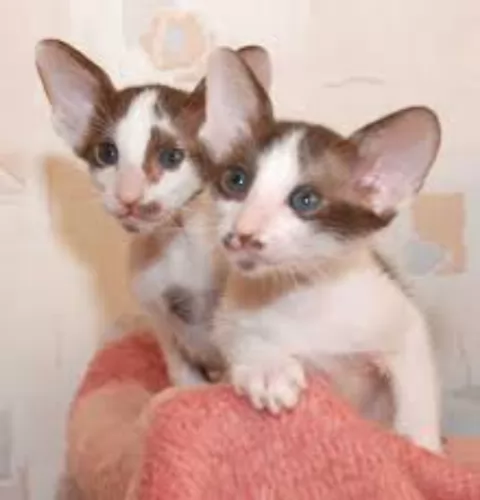 Any cat can develop health problems. Even kittens that come with a certificate of health can develop illnesses that you never thought possible.
Any cat can develop health problems. Even kittens that come with a certificate of health can develop illnesses that you never thought possible.
Orientals are generally healthy cats, but the health issues that may affect the Oriental are similar to that of the Siamese cat.
One of these is Progressive Retinal Atrophy (PRA). This is a genetic eye problem that can lead to blindness. Another disease to look out for is Asthma. The Siamese is susceptible to this disease which means your Oriental Bicolor will also be. You will have to get your furry friend to the vet who may precribe anti-inflammatory drugs.
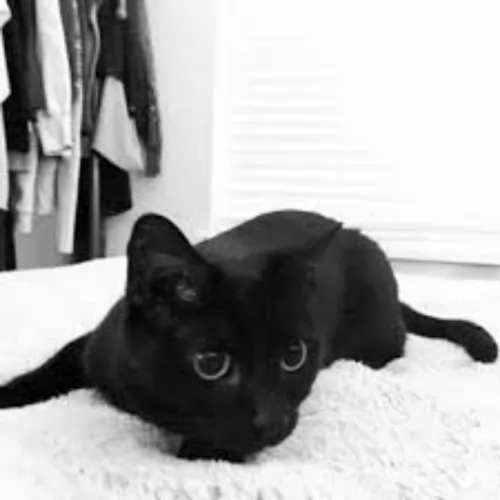 Hybrids suffer from genetic defects. These defects can often require surgery. A cat such as the Pantherette also requires a top-notch diet. You may even have to speak to your vet because these cats often battle to digest their food.
Hybrids suffer from genetic defects. These defects can often require surgery. A cat such as the Pantherette also requires a top-notch diet. You may even have to speak to your vet because these cats often battle to digest their food.
People who work with these hybrid cats say that a problem they often see is inflammatory bowel disease and diarrhea. Remember that cats like these are carnivores and their diets have to be made up essentially of meat if they are to remain healthy.
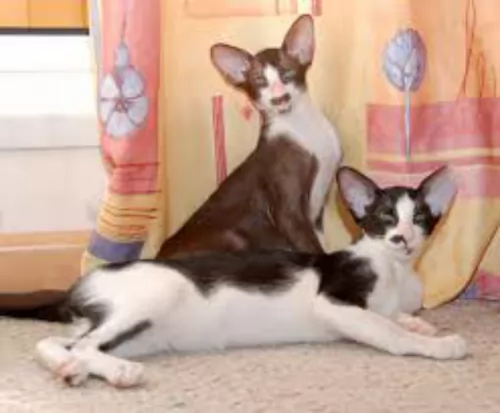 The Oriental Bicolor will require a brushing once a week. A good idea is to also take a warm, damp cloth and to wipe your cat down. It’s an excellent way to rid your cat of loose hairs as well as dust. The cat has a sparse coat, so brush him gently.
The Oriental Bicolor will require a brushing once a week. A good idea is to also take a warm, damp cloth and to wipe your cat down. It’s an excellent way to rid your cat of loose hairs as well as dust. The cat has a sparse coat, so brush him gently.
Other grooming requires nail clipping and checking inside his ears. If you clean his ears, be careful not to go deep into the ear. It is precisely why so many cat owners take their cat to the pet groomers where they can do these things professionally.
It’s very important to keep your Bicolor’s litter box spotlessly clean because like most cats, they won’t use their litterbox if it’s still got yesterday’s feces in it. It needs to be cleaned every day.
The Oriental’s diet is much like that of other cats – it has to be meaty. You can’t afford to not understand your feline pet’s dietary needs. Cats are carnivorous and they need commercial cat food that will be equal to fresh meat that they would normally find in the wild.
They need foods high in protein but they will still need some carbohydrates, amino acids, and vitamins, and minerals. Always go for the best quality pet cat foods because by buying the poorer quality ones you put your cat at risk of developing health problems. Never ever leave your cat without a constant supply of fresh, cool drinking water.
Supply your cat with all the things that make it a pleasure to have a cat. You don’t want to bring your pet home and only then start looking for things to make him at home. He’ll need food and water bowls, a nice warm, soft bed, a litter box, grooming accessories, collar, toys climbing tree and scratching pole.
Have your pet neutered or spayed to prevent unwanted kittens.
Make sure he is taken to the vet when ill. You shouldn't own a pet if you can't afford to pay vet fees. There are some cat illnesses that can make your cat very sick and uncomfortable. He should have his vaccines and also be treated for parasites.
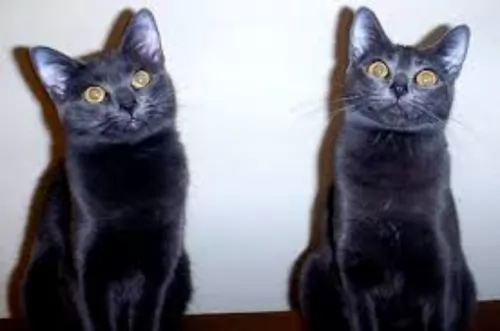 To ensure a quality lifestyle for your Panetherett, you want to care for him properly. A well cared for cat is one that becomes the best pet.
To ensure a quality lifestyle for your Panetherett, you want to care for him properly. A well cared for cat is one that becomes the best pet.
He will have to go to the vet at some stage for sickness and for his vaccines.
Make sure you invest in a cat carrier or sturdy leash as your cat won’t like going to the vet. These cats can struggle, wriggle and writhe and he will make every effort to get away.
Speak to your vet about ticks, fleas, and worms in your pet as these parasites can cause havoc with your cat’s health.
Domestic hybrids such as the Pantherette will need to have a litter box that is cleaned every day. These cats like a clean litter box. Make sure that you scoop the litter box at least one time each day. If you don't clean his litter box regularly, you’ll find that he tends to use other areas of your home as a toilet. Being a hybrid, it is quite likely that he will in any case as these cat's wild side see to this.
Ensure he gets the best cat food there is. A cat is a carnivore which means he is a meat eater. If you buy commercially manufactured pet food, make sure that the top ingredients on the label have meat and protein listed at the top.
Speak to your vet about the absolute importance of quality cat food for your feline pet, as poor quality food can make your cat sick and you’ll be spending more time at the vet.
Cats can easily become dehydrated, so ensure that he has a bowl of fresh, cool water available to him around the clock. You can have one or two water bowls available to him and the water bowls must be cleaned regularly.